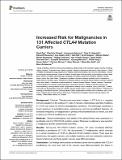Por favor, use este identificador para citar o enlazar a este item:
http://hdl.handle.net/10261/180587COMPARTIR / EXPORTAR:
 SHARE SHARE
 CORE
BASE CORE
BASE
|
|
| Visualizar otros formatos: MARC | Dublin Core | RDF | ORE | MODS | METS | DIDL | DATACITE | |

| Título: | Increased Risk for Malignancies in 131 Affected CTLA4 Mutation Carriers |
Autor: | Egg, David; Schwab, Charlotte; Gabrysch, Annemarie; Arkwright, Peter D.; Cheesman, Edmund; Giulino-Roth, Lisa; Neth, Olaf CSIC ORCID; Snapper, Scott; Okada, Satoshi; Moutschen, Michel; Delvenne, Philippe; Pecher, Ann-Christin; Wolff, Daniel; Kim, Yae-Jean; Seneviratne, Suranjith; Kim, Kyoung-Mee; Kang, Ji-Man; Ojaimi, Samar; McLean, Catriona; Warnatz, Klaus; Seidl, Maximilian; Grimbacher, Bodo | Palabras clave: | CTLA-4 Combined immunodeficiency Primary immunodeficiency Malignancy Cancer predisposition EBV CMV |
Fecha de publicación: | 10-sep-2018 | Editor: | Frontiers Media | Citación: | Frontiers in Immunology 9: 2012 (2018) | Resumen: | [Background] Cytotoxic T-lymphocyte-associated antigen 4 (CTLA-4) is a negative immune regulator on the surface of T cells. In humans, heterozygous germline mutations in CTLA4 can cause an immune dysregulation syndrome. The phenotype comprises a broad spectrum of autoinflammatory, autoimmune, and immunodeficient features. An increased frequency of malignancies in primary immunodeficiencies is known, but their incidence in CTLA-4 insufficiency is unknown. [Methods] Clinical manifestations and details of the clinical history were assessed in a worldwide cohort of 184 CTLA4 mutation carriers. Whenever a malignancy was reported, a malignancy-specific questionnaire was filled. [Results] Among the 184 CTLA4 mutation carriers, 131 were considered affected, indicating a penetrance of 71.2%. We documented 17 malignancies, which amounts to a cancer prevalence of 12.9% in affected CTLA4 mutation carriers. There were ten lymphomas, five gastric cancers, one multiple myeloma, and one metastatic melanoma. Seven lymphomas and three gastric cancers were EBV-associated. [Conclusion] Our findings demonstrate an elevated cancer risk for patients with CTLA-4 insufficiency. As more than half of the cancers were EBV-associated, the failure to control oncogenic viruses seems to be part of the CTLA-4-insufficient phenotype. Hence, lymphoproliferation and EBV viral load in blood should be carefully monitored, especially when immunosuppressing affected CTLA4 mutation carriers. |
Versión del editor: | https://doi.org/10.3389/fimmu.2018.02012 | URI: | http://hdl.handle.net/10261/180587 | DOI: | 10.3389/fimmu.2018.02012 | E-ISSN: | 1664-3224 |
| Aparece en las colecciones: | (IBIS) Artículos |
Ficheros en este ítem:
| Fichero | Descripción | Tamaño | Formato | |
|---|---|---|---|---|
| fimmu-09-02012.pdf | 5,95 MB | Adobe PDF |  Visualizar/Abrir |
CORE Recommender
PubMed Central
Citations
40
checked on 10-abr-2024
SCOPUSTM
Citations
73
checked on 20-abr-2024
WEB OF SCIENCETM
Citations
65
checked on 27-feb-2024
Page view(s)
195
checked on 22-abr-2024
Download(s)
129
checked on 22-abr-2024

